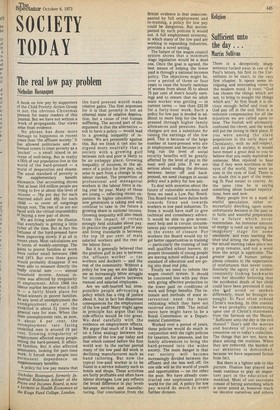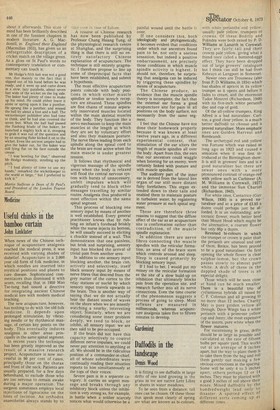Religion
Sufficient unto the day . . .
Martin Sullivan
There is a deceptively sharp sentence tucked away in one of St Paul's letters, his first to the Corinthians to be exact, in the very first .chapter. It opens some intriguing and interesting views to the modern mind. It runs: "God has chosen the things which are not, to bring to nought the things which are." At first blush it is obvious enough: belief and trust in God pay off in the end. Here is a welcome compensation for all the injustices we are called upon to bear. The foolish will ultimately confound the clever, and the weak will put the strong in their place. If you were among the slave population in the early days of Christianity, with no self-respect, and no place in society, it would have meant a great deal to you to believe that you really mattered to someone. Men rejoiced to hear that if they were worthless in the eyes of the world, they were as sons in the eyes of God. There is no doubt this is part of the meaning St Paul meant to convey. At the same time he is saying something about human expectations, here and now.
Many people live in a state of wistful speculation, either remorsefully dwelling upon some unfortunate decision in the past or in futile and wasteful preparation for a future which never materialises. An immense amount of energy is used up in setting an imaginary stage for some erico\inter, and even learning the lines' and acting the parts. When the actual meeting takes place not a prop remains, and not a word from the script is applicable. The greater part of human unhappiness consists in the expectation of misfortunes that never come. Similarly the agony of a mother constantly looking backwards over her shoulder believing that the accidental death of her child could have been prevented if only she kad acted or spoken differently, must be brought to nought. St Paul often echoed Christ's teaching. In this context he was probably commenting upon one of Christ's statements from the Sermon on the Mount. "Sufficient unto the day is the evil thereof." Don't add the worries and burdens of yesterday or tomorrow on to today's collection. The things that are not, have no place among the realities. When they are removed, the burden of our anxieties is diminished, because we have separated fiction from fact., But there is a lighter side to this picture. Illusion has played and must continue to play an important part in the education of mankind. Most of our successes consist of hitting something which is never aimed at, however much we deceive ourselves and others
about it afterwards. This state of mind has been brilliantly described in one of the funniest chapters in modern literature. A. G. Macdonell, in England their England (Macmillan 1933), has given us an unforgettable description of a cricket match on the village green. As a gloss on St Paul's words no contemporary translation or commentary can touch it:
Mr Hodge's fifth ball was not a good one, due mainly to the fact that it slipped out of his hand before he was ready, and it went up and came down In a slow, lazy parabola, about seven feet wide of the wicket on the leg side. The baker had plenty of time to make up his mind. He could either leave it alone or spring upon it like a panther. He sprang like a panther, and missed the ball by about a foot and a half. The wicketkeeper publisher also had time to think, and he had also covered the seven feet. When the ball had passed the flashing blade of the baker, he launched a mighty kick at it, stooping to grab it was out of the question and by an amazing fluke kicked it on to the wicket. Even the ancient umpire had to give the baker out, for the baker was still lying flat on his face outside the crease.
"I was bowling for that," observed Mr Hodge modestly, strolling up the pitch.
" I had plenty of time to use my hands," remarked the wicketkeeper to the world at large, "but I preferred to kick it."
Martin Sullivan is Dean of St Paul's and President of the London Tourist Board.



































 Previous page
Previous page